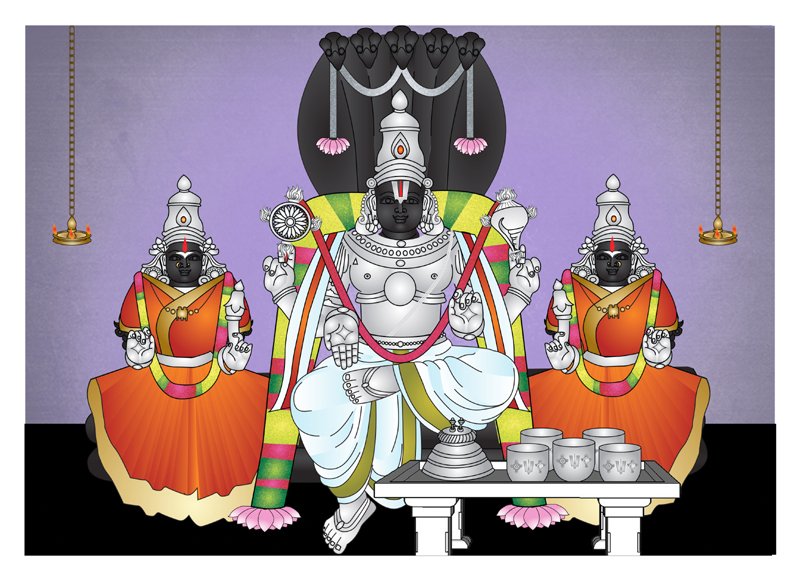Visited
81
Thiruvaragunamangai
திருவரகுணமங்கை (நவதிருப்பதி)

Navathiruppathi
ஸ்ரீ வரகுணவல்லீ ஸமேத ஸ்ரீ விஜயாஸநாய நமஹ
Historical Significance:
The story of this temple is narrated in the Brahmanda Purana. In ancient times, on the banks of the Reva River, in a place called Punniya Kosa, there lived a Brahmin named Vedavit. He fulfilled his duties to his mother, father, and teacher and devoted himself to meditation on Lord Vishnu, reciting the “Asanathai” mantra,
வரலாறு
இத்தலத்தைப் பற்றியும் பிரம்மாண்ட புராணத்தில்தான் சொல்லப்பட்டுள்ளது. முன்னொரு காலத்தில் ரேவா நதிக்கரையில் புண்ணிய கோசம் என்ற அக்கிரஹாரத்தில் வாழ்ந்து வந்த “வேதவித்” என்னும் பிராமணன் ஒருவன் மாதா. பிதா. குரு ஆகிய மூவருக்கும் செய்ய வேண்டிய கடன்களைச் செய்து முடித்து திருமாலைக் + Read more
இத்தலத்தைப் பற்றியும் பிரம்மாண்ட புராணத்தில்தான் சொல்லப்பட்டுள்ளது. முன்னொரு காலத்தில் ரேவா நதிக்கரையில் புண்ணிய கோசம் என்ற அக்கிரஹாரத்தில் வாழ்ந்து வந்த “வேதவித்” என்னும் பிராமணன் ஒருவன் மாதா. பிதா. குரு ஆகிய மூவருக்கும் செய்ய வேண்டிய கடன்களைச் செய்து முடித்து திருமாலைக் + Read more
Thayar: Sri Varaguna Valli Thāyār (Sri Varagunamangai Thāyār)
Moolavar: Vijayāsana Perumāl
Utsavar: Vijayāsana Perumāl
Vimaanam: Vijayakodi
Pushkarani: Agni Theertham, Deva Pushkarani
Thirukolam: Amarndha (Sitting)
Direction: East
Mandalam: Pandiya Nādu
Area: Tirunelveli
State: TamilNadu
Coordinates: https://maps.app.goo.gl/1SoenpdHPHaDVvFS7
Sampradayam: Thenkalai
Timings: 10:00 a.m. to 5:00 p.m.
Search Keyword: Varagunamangai
Mangalāsāsanam: Namm Āzhvār
Chronicles by underthetree.me
81
Recitation
TVM 9.2.4
Tamil
Simplified
English
Verse info
Synonyms
Translation
TVM 9.2.4
3687 புளிங்குடிக்கிடந்துவரகுணமங்கையிருந்து
வைகுந்தத்துள்நின்று *
தெளிந்தவென்சிந்தையகங்கழியாதே
என்னையாள்வாய்! எனக்கருளி *
நளிந்தசீருலகமூன்றுடன்வியப்ப
நாங்கள்கூத்தாடிநின்றார்ப்ப *
பளிங்குநீர்முகிலின்பவளம்போல்
கனிவாய்சிவப்ப நீகாணவாராயே.
வைகுந்தத்துள்நின்று *
தெளிந்தவென்சிந்தையகங்கழியாதே
என்னையாள்வாய்! எனக்கருளி *
நளிந்தசீருலகமூன்றுடன்வியப்ப
நாங்கள்கூத்தாடிநின்றார்ப்ப *
பளிங்குநீர்முகிலின்பவளம்போல்
கனிவாய்சிவப்ப நீகாணவாராயே.
3687 புளிங்குடிக் கிடந்து வரகுணமங்கை
இருந்து * வைகுந்தத்துள் நின்று *
தெளிந்த என் சிந்தையகம் கழியாதே *
என்னை ஆள்வாய் எனக்கு அருளி **
நளிர்ந்த சீர் உலகம் மூன்றுடன் வியப்ப *
நாங்கள் கூத்து ஆடி நின்று ஆர்ப்ப *
பளிங்கு நீர் முகிலின் பவளம் போல் * கனிவாய்
சிவப்ப நீ காண வாராயே (4)
இருந்து * வைகுந்தத்துள் நின்று *
தெளிந்த என் சிந்தையகம் கழியாதே *
என்னை ஆள்வாய் எனக்கு அருளி **
நளிர்ந்த சீர் உலகம் மூன்றுடன் வியப்ப *
நாங்கள் கூத்து ஆடி நின்று ஆர்ப்ப *
பளிங்கு நீர் முகிலின் பவளம் போல் * கனிவாய்
சிவப்ப நீ காண வாராயே (4)
3687 pul̤iṅkuṭik kiṭantu varakuṇamaṅkai
iruntu * vaikuntattul̤ niṉṟu *
tĕl̤inta ĕṉ cintaiyakam kazhiyāte *
ĕṉṉai āl̤vāy ĕṉakku arul̤i **
nal̤irnta cīr ulakam mūṉṟuṭaṉ viyappa *
nāṅkal̤ kūttu āṭi niṉṟu ārppa *
pal̤iṅku nīr mukiliṉ paval̤am pol * kaṉivāy
civappa nī kāṇa vārāye (4)
iruntu * vaikuntattul̤ niṉṟu *
tĕl̤inta ĕṉ cintaiyakam kazhiyāte *
ĕṉṉai āl̤vāy ĕṉakku arul̤i **
nal̤irnta cīr ulakam mūṉṟuṭaṉ viyappa *
nāṅkal̤ kūttu āṭi niṉṟu ārppa *
pal̤iṅku nīr mukiliṉ paval̤am pol * kaṉivāy
civappa nī kāṇa vārāye (4)
Ragam
Dvajāvanti / த்வஜாவந்தி
Thalam
Ādi / ஆதி
Bhavam
Self
Divya Desam
Simple Translation
3687. You bestowed upon me clarity that will never depart, oh my Master, reclining in Puḷiṅkuṭi. You remain seated in Varakuṇamaṅkai and stand in Vaikuṇṭam. May You shower Your astounding grace upon me, causing the three worlds to dance with joy, and let us behold Your enchanting lips, resembling the coral creeper embracing the dark cloud laden with clear water.
Explanatory Notes
(i) In His iconic manifestation, the Lord assumes different postures; in certain pilgrim centres, He reposes, in some, He is seen seated, while, in others, He keeps standing. These can be adored individually as well as collectively, as in this song. As Saint Nammāḻvār contemplated on the manifestations of the Lord, in His worshippable Forms, at the various pilgrim centres,
Word by Word (WBW) meaning
(The words may be rearranged to facilitate conversion from poetry to prose (Aṉvayam). Please read the meanings (in black) continuously to form the sentence and understand the simplified meaning based on the Divyārtha Dīpikai for the verse.)
புளிங்குடி — திருப்புளிங்குடியிலே; கிடந்து — சயனித்தும்; வரகுண மங்கை — வரகுண மங்கையில்; இருந்து — வீற்றிருந்தும்; வைகுந்தத்துள் நின்று — வைகுந்தத்தில் நின்றும்; என் சிந்தையகம் — என் சிந்தையை; தெளிந்த — தெளியவைத்து; கழியாதே — அங்கிருந்து பிரியாமல்; என்னை ஆள்வாய் — என்னை அடிமை கொண்டவனே; எனக்கு அருளி — எனக்கு கிருபை பண்ணினவனே; நளிர்ந்த சீர் — குளிர்ந்த உன் சீல குணங்களை; உலகம் மூன்றுடன் — மூன்று உலகங்களும்; வியப்ப — ஆச்சரியப் படும்படியாகவும்; நாங்கள் கூத்து ஆடி — நாங்கள் மனம் மகிழ்ந்து; நின்று ஆர்ப்ப — கோலாஹலம் செய்யும்படியாகவும்; பளிங்கு நீர் — தெளிந்த நீராலே நிறைந்த; முகிலின் — காளமேகத்தில்; பவளம்போல் — பவளக்கொடி படர்ந்தாற் போல்; கனிவாய் — உன்னுடைய கனிந்த அதரம்; சிவப்ப — சிவந்து தோன்றும் அழகை; காண — நாங்கள் கண்டு அநுபவிக்கும்படி; நீ வாராயே — நீ வரவேண்டும்
varaguṇamangai — in thiruvaraguṇamangai; irundhu — sitting; vaigundhaththul̤ — in ṣrīvaikuṇtam; ninṛu — standing; thel̤indha — having clarity (that these are done for us); en — my; sindhai agam — standing in my heart; kazhiyādhĕ — without leaving; ennai — me; āl̤vāy — oh one who enslaved!; enakku — for me; arul̤i — granting special mercy; nal̤irndha — cool; sīr — qualities such as ṣeela etc; ulagam mūnṛu — the three worlds; udan — with a single voice; viyappa — to the amaśement saying -what a partiality towards his devotees!-; nāngal̤ — us (who are going to see you, being an ananya prayŏjana (without any expectation)); kūththādi — dancing out of joy; ninṛu — stand; ārppa — to make huge noise of celebration; pal̤ingu — pure; nīr — filled with water; mugilin — in dark cloud; paval̤ampŏl — like a coral creeper which is spread out; kani — having friendly colour; vāy — divine lips; sivappa — to manifest the reddishness; kāṇa — to be seen and enjoyed by us; nī vārāy — you should mercifully walk towards us; paval̤am — coral-s; nan — dense